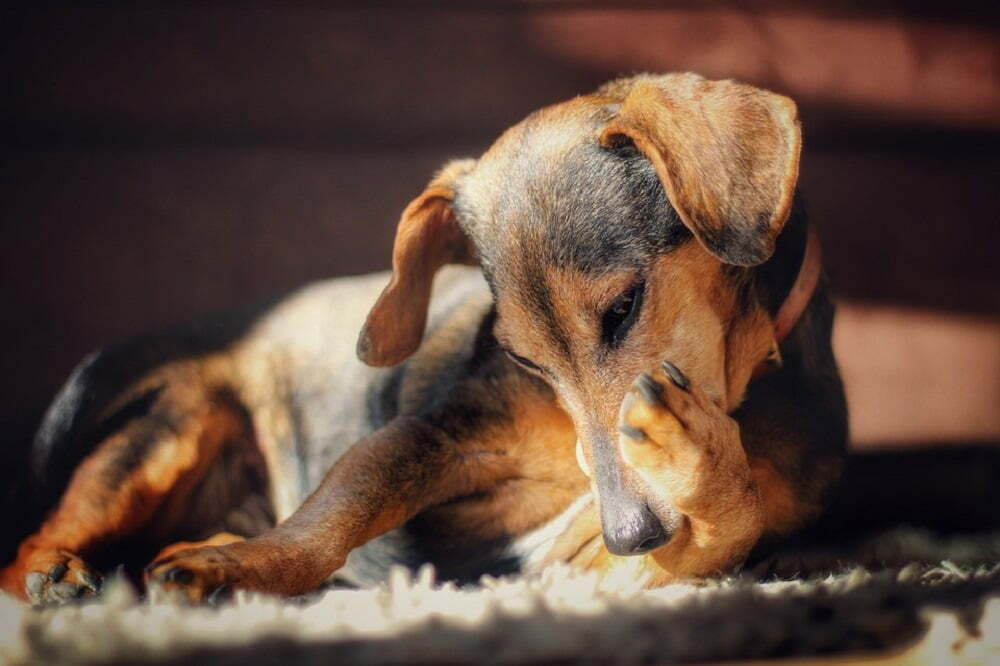Parvovirus is an infectious disease that can be very harmful and fatal to dogs. The majority of dogs who contract parvovirus are at a very high risk of becoming unwell, or dying. This is why it is so vital that you vaccinate your dog against the virus, to give them the best chance of living a healthy, happy and long life.
However, as a responsible dog owner, you may be wondering if your dog can still contract parvo, even if they have been vaccinated. Vaccination gives your dog the most protection from parvovirus, but some dogs may react differently to the virus, or it may not be as effective against newer strains of parvovirus. Therefore, in some cases, a vaccinated dog can contract parvovirus, but the likelihood of this happening is very slim.
As with many vaccines, they may not protect you entirely against the virus, as some strains can mutate and are not covered by the vaccine. That being said, having a vaccine is the best and most effective way of protecting against harmful viruses and diseases, and will give your dog the best possible chance of surviving and not catching the fatal virus.
To help you understand why it is so important to vaccinate your dog against parvo, we have created a guide answering all of your questions regarding this virus. But first, let’s take a look at what exactly is parvo.

What is Parvo?
Parvo is short for parvovirus. This is a highly contagious and infectious disease that can be extremely fatal for dogs. This is because parvovirus works to attack the cells inside your dog’s body, and destroys the intestines. This means that your dog is unable to absorb vital nutrients, and will become weak, suppressed and dehydrated.
In addition, parvovirus can attack and affect the bone marrow in dogs, which prevents them from producing white blood cells that are essential in warding off infections and bacteria. Parvovirus unfortunately can also destroy the body over time, causing extreme sickness and diarrhea, which can be very unhealthy for your dog.
In puppies, parvo can also attack the heart, which can damage it and result in a fatal outcome.
Which dog breeds are more susceptible to parvo?
All dogs are at risk of parvovirus, however, some breeds are more susceptible to the disease. These are considered high risk, and can be affected more by parvo than other dogs. The most susceptible breeds are German Shepherds, Rottweilers, Dobermans, English Springer Spaniels and American Pit Bull Terriers.
It is these breeds that have the lowest survival rate of parvovirus, and can deteriorate much quicker than others, with a much lower chance of recovery if they contract the virus. However, it is important to note that even if your dog is not a breed that is highly susceptible, then you should not delay in having them vaccinated as it protects not only them but other dogs around them.
Can puppies get parvo?
Unfortunately, yes, puppies can get parvo. Puppies are actually most at risk of catching parvo from about six weeks of age to six months of age, because before then, they would still have some of their mother’s antibodies against parvo from her vaccinations. After that, they would need to be vaccinated themselves to give them the best protection from the virus.
Puppies should be vaccinated in three doses, from six weeks to eight weeks and twelve weeks old. They will have to have all three doses of the vaccination, otherwise they may still be at risk, not covered and not fully protected from the disease.
In addition, puppies that contract parvovirus can be affected differently. For instance, they may be susceptible because they are stressed, going to a new home, or living in a rescue, and their immune systems may be down because they are being weaned onto solid foods. As they are most susceptible at this stage in their lives, it is paramount that puppies get fully vaccinated.
How do dogs get parvo?
Parvo, like other viruses can survive for a very long time, and it is highly contagious, which makes it a very dangerous disease. The virus itself can withstand weather conditions, regular cleaning and maintenance, and can still be transmitted and infectious on surfaces for at least a month.
On the other hand, parvovirus outdoors can last up to a year before the risk lessens. This is why parvovirus can be rife in outdoor areas where you walk your dog such as the park, and can spread among dogs incredibly easily and quickly.
Dogs can also catch parvovirus from standing on infected ground, or from someone’s shoes, and so you have to exercise caution when it comes to this virus. In addition to this, parvovirus can be transmitted dog to dog through their feces. This means that if an infected dog poops on the floor, and other dogs sniff this, or eat this (it happens), then they will become infected too.
Of course, parvovirus can also pass from dog to dog through contact as most viruses do, and can be passed on and spread very easily. If you are concerned whether your dog has been in contact with another dog with parvovirus, then you should contact the veterinarian immediately, and purchase special sanitizing equipment to properly cleanse and clear the home, garden and any other places that your dog comes into contact with.
What are the first symptoms of parvo?
Parvovirus can have devastating effects, and the symptoms can come on, and worsen very quickly. This is why you need to stop it in its tracks, and understand the signs to give your dog the best chance of survival.
The most common symptoms of parvovirus are vomiting, high temperatures, loss of appetite, lack of energy, lethargy, dehydration, and diarrhea. In addition, some dogs may have spots of blood in their poop that you should look out for.
Keep in mind that dogs can be sick a lot, and so just because they are vomiting, it does not mean they have parvo. However, if you notice a change in their behavior, habits, energy levels and temperature, then they will need immediate medical assistance. If you are unsure, then always seek professional advice, it is better to be safe than sorry!
However, as parvovirus is highly infectious, you must tell the veterinarian about your concerns before going. This is because they will need to quarantine you and the dog to prevent the virus from spreading amongst other dogs at the clinic.
How to prevent your dog from getting parvo

It’s not all doom and gloom, you can prevent your dog from getting parvovirus. The most important thing is ensuring that they have all of the necessary vaccinations to keep them safe from this virus. There are two main ways that you can protect your dog.
Vaccinate them:
Every dog should have a full vaccination record of parvovirus vaccinations. They should receive this as a puppy, and will need to have boosters administered by the veterinarian to ensure that they are fully covered. Puppies will have initial immunity from the virus for up to six weeks after birth, but then they will need their own vaccinations.
To give your puppy the best chance of protection and prevention, make sure that they have a vaccine at 6 weeks old, then another at 8 weeks and 12 weeks. They will need all three for the vaccine to be effective!
Keep young dogs away from risky areas:
In addition to vaccinating a puppy, you will need to ensure that they do not come into contact with unvaccinated dogs, or areas where the virus may be until they have had all boosters and vaccines. Areas where there may be a lot of dogs such as dog parks, local gardens or beaches should be avoided until the puppy is fully covered, just to be safe.
Parvovirus can also be passed on through the feet via the ground, so only let your puppy go places where there is no parvovirus, risk of parvovirus, or where the floor can be thoroughly cleaned and sanitized for the utmost safety of your dog. Once your pup is fully vaccinated, they will be safe, protected and covered from the virus.
Can a dog survive parvo?
If a dog contracts parvovirus, and the symptoms are spotted quickly, then there is a good chance of survival. The American Veterinary Medical Association states that around 90% of dogs who contract the virus, and are treated early survive the disease.
However, dogs with parvovirus can die very quickly, and so it is vital that you spot the signs as soon as possible. Some dogs can die within two or three days of the first symptoms showing, and so you will need to act fast and contact a veterinarian as soon as you can.
There is no actual medication that will treat parvovirus, but if you take your dog to the veterinarian, they can support your dog, and help the body fight off the infection itself. As parvovirus can dehydrate and stop the body from working, whilst in care, the dog can have plenty of fluids, and the veterinarian can control and watch over the dog whilst it fights the virus.
How long are puppies contagious with parvo?
If a puppy has parvovirus, then they can spread the virus unknowingly. The infection can spread within four days of the puppy being exposed to it in the first place. Even if a dog has treatment for parvovirus, and the symptoms have all gone, they can still be infectious for around 10 days after having it.
This is why you have to quarantine your puppy or dog if they contract parvovirus, as it can spread very easily and quickly amongst other dogs without you knowing.
Conclusion
To conclude, you should always vaccinate your puppy or dog against parvovirus as it is a very infectious disease that is fatal for many dogs.
Whilst some dogs can still contract parvovirus after being vaccinated, it is very rare, and vaccination provides the most protection, and the best chance of your dog surviving.
